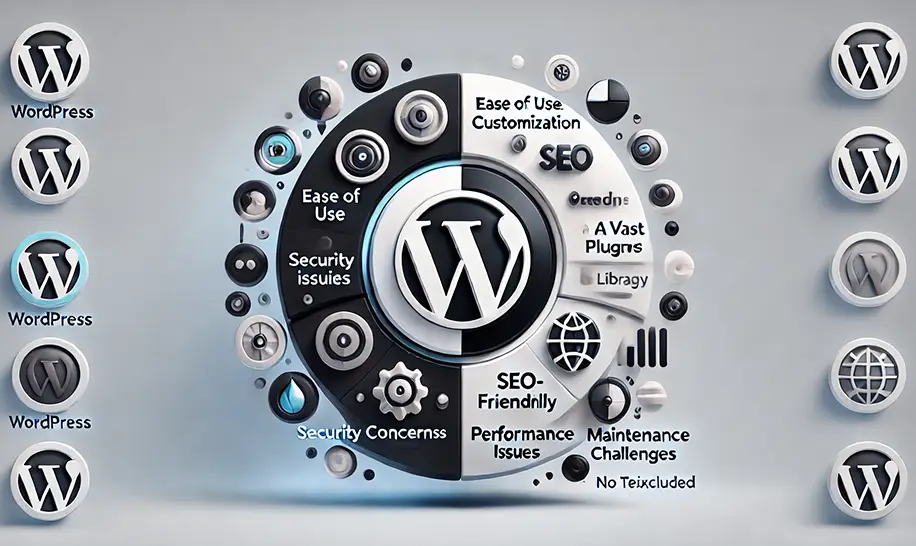
WordPress: A Critical Look at Its Advantages and Disadvantages.
WordPress has become synonymous with website creation, powering over 40% of all websites globally. As a leading content management system (CMS), WordPress is often the go-to platform for bloggers, small businesses, and even large enterprises. However, despite its popularity, WordPress comes with both remarkable strengths and notable drawbacks. Whether you're a web developer, business owner, or blogger, understanding the WordPress pros and cons is vital before diving into the world of this powerful platform.
Why WordPress Dominates the Web Development Space
1. Open-Source Flexibility and Freedom
One of the most significant advantages of WordPress is its open-source nature. This means that anyone can download, modify, and use it for free. With thousands of developers contributing to its growth, the platform offers endless customization options. From simple blogs to complex e-commerce sites, WordPress can be tailored to suit virtually any need.
2. Extensive Theme and Plugin Ecosystem
Another reason WordPress leads the market is its massive library of themes and plugins. The WordPress repository alone offers over 60,000 plugins, and premium marketplaces add even more to the mix. Whether you want to integrate SEO tools, security features, or e-commerce capabilities via WooCommerce, there's a plugin for almost every functionality imaginable.
3. SEO-Friendly Structure
WordPress is built with search engine optimization (SEO) in mind. Its clean, semantic code allows search engines to easily crawl your site. Plugins like Yoast SEO or Rank Math further enhance its capabilities by helping you optimize meta tags, create XML sitemaps, and implement schema markup.
Additionally, WordPress gives users control over permalinks, alt text, and title tags — critical elements for improving on-page SEO. This makes it a favorite for marketers who want a SEO-optimized website without needing advanced coding skills.
4. User-Friendly and Beginner-Friendly
Compared to some CMS platforms, WordPress is intuitive and relatively easy to use. Its user-friendly dashboard simplifies content creation, media uploads, and website management. For non-technical users, this ease of use is invaluable.
Drag-and-drop page builders like Elementor, WPBakery, or Divi further lower the learning curve, allowing users to design professional-looking websites without writing a single line of code.
5. Strong Community and Support
The WordPress community is vast and incredibly supportive. Whether you encounter a technical issue or need design inspiration, countless forums, blogs, and tutorials are available online. Additionally, premium theme and plugin providers often offer dedicated customer support.
The Disadvantages of WordPress: What You Should Know
1. Security Vulnerabilities
Since WordPress powers a significant chunk of the web, it's a frequent target for hackers and malware. Vulnerabilities often arise from outdated plugins or themes, poor hosting environments, or weak passwords. While there are security plugins like Wordfence and Sucuri that help protect your site, WordPress still requires proactive security measures.
2. Performance and Speed Issues
Out of the box, WordPress can sometimes be sluggish, especially when using multiple plugins or poorly coded themes. Performance optimization is essential for user experience and SEO rankings. You'll need to leverage caching plugins, a Content Delivery Network (CDN), image optimization, and quality hosting to maintain optimal load times.
3. Frequent Updates Can Be Problematic
While regular updates enhance security and performance, they can also break your site if plugins, themes, or custom code are not compatible with the latest WordPress core version. Site owners must either keep a close eye on updates or invest in a WordPress maintenance service to handle updates safely.
4. Customization Can Get Expensive
Although WordPress itself is free, customization costs can add up. Premium themes, plugins, custom development, and ongoing maintenance may require a substantial budget, particularly for more complex websites or businesses with specific needs.
5. Learning Curve for Advanced Features
While WordPress is easy for basic tasks, more advanced functionalities — like creating custom post types, advanced custom fields (ACF), or building custom plugins — require coding knowledge. Without HTML, CSS, PHP, or JavaScript skills, you might find yourself reliant on a developer.
Is WordPress Right for Your Website?
Ultimately, whether or not you choose WordPress depends on your specific needs, budget, and technical expertise. If you require a flexible, SEO-friendly website with a large ecosystem of plugins and themes, WordPress is an excellent choice. However, if you prefer an all-in-one solution with less maintenance — like Squarespace, Wix, or Shopify — WordPress might not be your ideal fit.
Final Thoughts
WordPress is undoubtedly a powerful and versatile platform, but it is not without its challenges. By weighing the advantages and disadvantages of WordPress, you can make an informed decision that aligns with your business goals.



